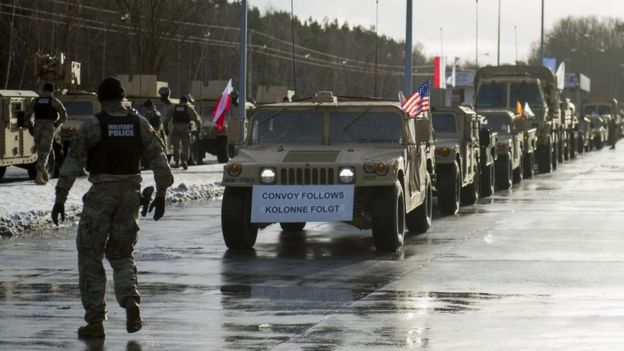
This article is more than
9 year oldThe troops are part of President Barack Obama's response to reassure Nato allies concerned about a more aggressive Russia.
It is the largest US military reinforcement of Europe in decades.
President Vladimir Putin's spokesman Dmitry Peskov told the BBC that the move "threatens our interests and our security".
"It's a third country that is building up its military presence on our borders in Europe," he said. "It isn't even a European country."
Russian Deputy Foreign Minister Alexei Mechkov called the deployment a "factor destabilising European security".
Poland's Undersecretary of State for Defence Tomasz Szatkowski said the deployment was necessary because of Russia's "large exercises" next to its border and its "aggressive actions in our vicinity - I mean Ukraine and the illegal annexation of Crimea".
More than 80 main battle tanks and hundreds of armoured vehicles have already arrived in Germany and are now being moved into eastern Europe by road and rail.

Part of the US force entered at Poland's Olszyna border crossing with Germany on Thursday.
The plan is to rotate the forces every nine months. Other nations involved in the rotation are Estonia, Latvia, Lithuania, Romania, Bulgaria and Hungary.
The US Armoured Brigade will also carry out military exercises in the Baltics, all part of President Obama's response to Russia's intervention in Ukraine and to reassure nervous Nato allies.
Last October, Russia sent nuclear-capable Iskander missiles to its exclave of Kaliningrad, sandwiched between Poland and Lithuania, followed a month later by Bastion anti-ship missile launchers.
The arrival of the US forces in eastern Europe comes just days before the inauguration of Donald Trump, who has signalled he wants to improve relations with Moscow.
The election of Mr Trump has raised questions as to whether this heightened US military posture will continue, BBC defence correspondent Jonathan Beale reports from Poland.
Mr Trump's nomination for defence secretary - Gen James Mattis - is likely to be asked about the new administration's attitude to Russia in his Senate confirmation hearing later on Thursday.